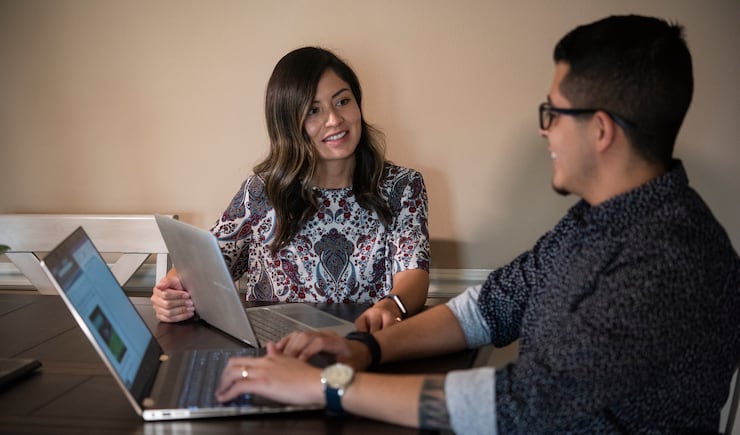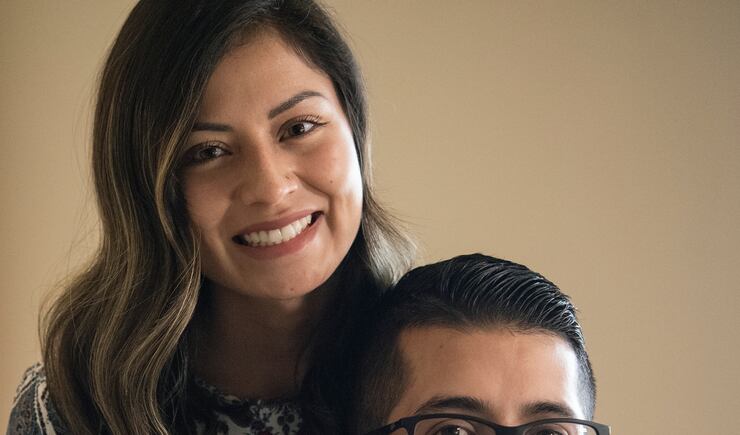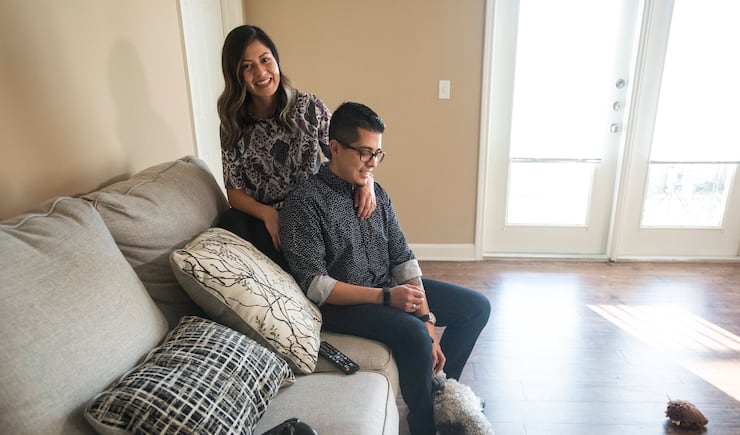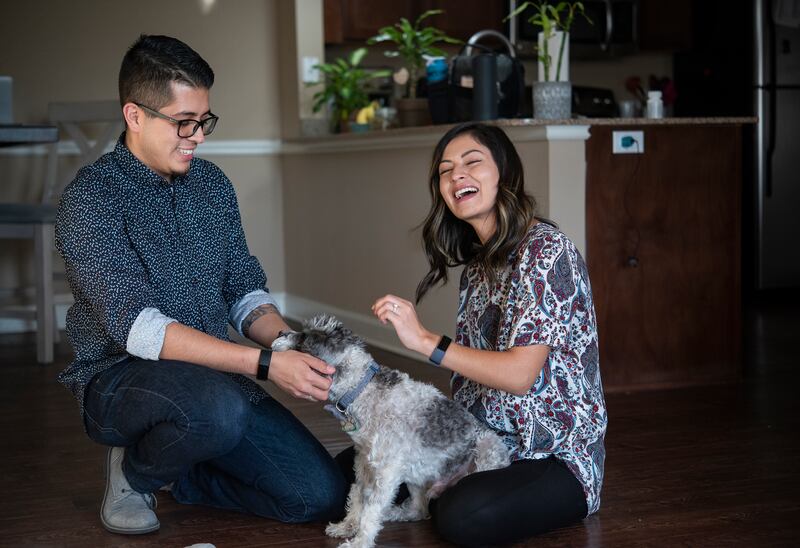SALT LAKE CITY — In mid-November, the Supreme Court will hear oral argument on whether it was lawful for the Trump administration in 2017 to terminate the Deferred Action for Childhood Arrivals program. Federal courts put the phase-out on hold pending the outcome of legal challenges.
For Yishay Valbuena and Manny Diaz, a young married couple who recently moved to east-Central Texas from Utah, the only home they’ve ever known, the court’s decision could have life-altering consequences.
DACA effectively presses the pause button on deportations of qualifying youths who aren’t authorized to be in the United States. They must be students in or graduates of American high schools who have no criminal records. DACA approval means they can work and attend college.
For someone who couldn’t even get a job at a fast food restaurant because he had no Social Security number, Diaz said the authorization to work changed the trajectory of his life.
“I still don’t get financial assistance. I don’t get grants. But at least I have a shot at paying for school,” said Diaz, who is working toward an undergraduate degree taking online classes from Salt Lake Community College and working for a financial services firm.
“So it really meant being able to live a normal life and to have a shot to make something of myself,” he said. A graduate of East High School who worked as a youth pastor in Utah, Diaz came to the United States from Mexico with his family when he was 7 years old.
Valbuena graduated last spring from the University of Utah with a degree in mechanical engineering. The couple recently moved to Tyler, Texas after she was hired as a test engineer with TRANE, an international manufacturer of heating, ventilating and air conditioning systems.
This is the first time they’ve lived away from family, Diaz said.
“It’s just us two now. It’s healthy for our marriage but it does require a lot of reestablishing, you know? Establishing our own traditions, who we are as a couple away from our families,” he said.
Both were nervous about relocating, but as devout Christians, they feel at home in Texas, where many others also highly value their faith, she said.
As busy as they are with work, school and taking the next steps in married life, the future of DACA weighs heavy on their minds.
“Yishay tries to not think about it. I’m the opposite. I read up on the news. I think I check the news, specifically in regards to DACA, two to three times a day,” he said.
His deepest fear is being separated from his wife, who came to the United States from Colombia with her family when she was 4 years old.
Valbuena said it would be gut-wrenching to lose the opportunity to continue the accelerated development program she just started with Trane.
“What that would mean to my husband and I would be devastating. My husband is from Mexico, and I’m from Colombia. So should we face deportation, we don’t go back to the same country,” she said.
Their fear is especially profound because Diaz said he once believed “there’s no way Trump would get elected,” let alone do away with DACA.
“And here we are. It’s all happened,” he said.





The announced phase-out of DACA is on hold pending the outcome of the Supreme Court hearing on three consolidated cases that challenged whether the Trump administration’s termination of DACA was lawful.
Ramping up to oral argument, 165 colleges and universities nationwide — three in Utah — have joined an amicus brief supporting some 700,000 young immigrants who came to the United States as children and have DACA protections.
The “friend of the court” brief, coordinated by the Presidents’ Alliance on Higher Education and Immigration, describes DACA “as enlightened and humane.”
“It represents the very best of America. It provides legal certainty for a generation of hard-working, high-achieving, and determined young people who love this country and were raised here,” the brief states.
DACA recipients “work hard in the classroom and become deeply engaged in co-curricular activities, supporting communities on and off campus. Moreover, our DACA students are deeply committed to giving back to their communities and, more broadly, the country they love. We should not be pushing them out of the country or returning them to a life in the shadows,” it states.
The three Utah institutions that joined the brief include Westminster College, Weber State University, and Valbuena’s alma mater, the U.
Valbuena said she is pleased the U. has stepped forward on supporting DACA, noting the university’s attitude toward and treatment of DACA students evolved during her years as an undergraduate.
Early on in her college studies, she called the financial aid office and got a chilly reception. “I don’t know if it was because I was pushing so much for an answer but they forwarded me on to the man that handled the office at the time, and he said, ‘You know what, we just don’t help people like you.’ And he kind of shoved me off the phone and hung up on me,” she said.
Fast forward to 2019, with the U. joining an amicus brief supporting DACA, “it’s like opposite ends of the spectrum,” she said.
While non-citizens do not qualify for federal financial aid, Utah has extended resident tuition rates to students who graduated from a Utah high school after attending for at least three years under legislation passed in 2002. Some 1,200 students are on the waiver across the Utah System of Higher Education, which serves a total headcount of 189,351, according to its latest enrollment figures.
While they don’t qualify for federal financial aid, Valbuena said many Dreamers chip in scholarships to help other unauthorized students meet their goals of a college degree or career.
In 2017, then-Utah Commissioner of Higher Education Dave Buhler and the presidents of all eight state colleges and universities wrote a letter to Utah’s congressional delegation calling for a legislative solution with respect to DACA “to enable all students who have grown up in the United States to continue contributing to their communities and classrooms in ways made possible by higher education.”
In so many respects, that’s Valbuena’s and Diaz’s story.
In addition to his work as a youth pastor, Diaz taught Bible study to youth in Salt Lake County’s detention center.
Valbuena volunteered with the American Red Cross throughout high school. Through leadership positions with the Society of Hispanic Professional Engineers, she guided fellow college students and mentored low-income elementary schoolers in science, technology, engineering and math (STEM) activities.
“We have been able to accomplish these things thanks to the freedom that DACA has provided us. Because we are not in the shadows and we have permission to work decent jobs, we have been able to dedicate time to the community and I like to think we have been beneficial to our communities,” she said.
Unlike most DACA recipients who keep a low profile out of fear of exposing parents or other family members who are unauthorized, she has consented to newspaper interviews (this is her second with the Deseret News), she took part in a limited release documentary, and the couple just participated in a podcast to tell their stories and help dispel myths and misunderstandings about DACA.
DACA has helped forge a path forward for the couple, but ultimately, reapplying for DACA every two years is no way to plan a future, Diaz said.
“I need to reapply every two years and hope that someone finds me worthy of staying here and having a job. So I think the solution for Dreamers has to be more than just DACA. It has to be something that can give us a permanent livelihood and something that can let us rest at night,” he said.
Valbuena said she too would prefer a solution beyond DACA that leads to citizenship.
“I’d love something permanent. I’d love something that gives me an opportunity to actually be a citizen, vote, and travel outside of the country and see my family there. I haven’t seen them since I was 4 years old. Sure, I’d love that. But it’s not promised,” she said.
“I’d love something permanent. I’d love something that gives me an opportunity to actually be a citizen, vote, and travel outside of the country and see my family there.”
“And as much as it’s been said, and as much as people, as I have advocated for it, have heard our story, nothing’s been done. So I have no faith that if DACA was done away with, another solution would be implemented for us.”
Valbuena’s thoughts are trained on the sacrifices of their families who brought them to the United States as small children with the hope they could become college educated and fare better in life than they had.
She carried that sense of duty every time she took a test or a difficult class. “I’m going to go to college no matter what it takes, and I’m going to work hard, and I’m going to represent us well,” she said.
Now, the future of DACA — and their lives — hangs in the balance of a court ruling.
“I’m just trying to, you know, live out my dreams and do the best that I can at work. And sometimes it’s hard to do that when you’re always thinking about what’s going to happen tomorrow,” she said.







